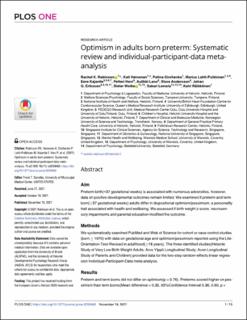| dc.contributor.author | Robinson, Rachel K. | |
| dc.contributor.author | Heinonen, Kati | |
| dc.contributor.author | Girchenko, Polina | |
| dc.contributor.author | Lahti-Pulkkinen, Marius | |
| dc.contributor.author | Kajantie, Eero Olavi | |
| dc.contributor.author | Hovi, Petteri | |
| dc.contributor.author | Lano, Aulikki | |
| dc.contributor.author | Andersson, Sture | |
| dc.contributor.author | Eriksson, Johan G. | |
| dc.contributor.author | Wolke, Dieter | |
| dc.contributor.author | Lemola, Sakari | |
| dc.contributor.author | Raikkonen, Katri | |
| dc.date.accessioned | 2023-01-23T09:23:14Z | |
| dc.date.available | 2023-01-23T09:23:14Z | |
| dc.date.created | 2021-12-02T15:36:48Z | |
| dc.date.issued | 2021 | |
| dc.identifier.citation | PLOS ONE. 2021, 16 (11), . | en_US |
| dc.identifier.issn | 1932-6203 | |
| dc.identifier.uri | https://hdl.handle.net/11250/3045181 | |
| dc.description.abstract | Aim Preterm birth(<37 gestational weeks) is associated with numerous adversities, however, data on positive developmental outcomes remain limited. We examined if preterm and term born(≥37 gestational weeks) adults differ in dispositional optimism/pessimism, a personality trait associated with health and wellbeing. We assessed if birth weight z-score, neurosensory impairments and parental education modified the outcome. Methods We systematically searched PubMed and Web of Science for cohort or case-control studies(born ≥ 1970) with data on gestational age and optimism/pessimism reported using the Life-Orientation-Test-Revised in adulthood(≥18 years). The three identified studies(Helsinki Study of Very Low Birth Weight Adults; Arvo Ylppö Longitudinal Study; Avon Longitudinal Study of Parents and Children) provided data for the two-step random-effects linear regression Individual-Participant-Data meta-analysis. Results Preterm and term borns did not differ on optimism(p = 0.76). Preterms scored higher on pessimism than term borns(Mean difference = 0.35, 95%Confidence Interval 0.36, 0.60, p = 0.007), although not after full adjustment. Preterm born participants, but not term born participants, with higher birth weight z-score, had higher optimism scores (0.30 raw score units per standard deviation increase, 95% CI 0.10, 0.49, p = 0.003); preterm vs term x birth weight z-score interaction p = 0.004). Conclusions Preterm and term born adults display similar optimism. In preterms, higher birth weight may foster developmental trajectories promoting more optimistic life orientations. | en_US |
| dc.language.iso | eng | en_US |
| dc.publisher | PLOS, Public Library of Science | en_US |
| dc.rights | Navngivelse 4.0 Internasjonal | * |
| dc.rights.uri | http://creativecommons.org/licenses/by/4.0/deed.no | * |
| dc.title | Optimism in adults born preterm: Systematic review and individual-participant-data metaanalysis | en_US |
| dc.title.alternative | Optimism in adults born preterm: Systematic review and individual-participant-data metaanalysis | en_US |
| dc.type | Peer reviewed | en_US |
| dc.type | Journal article | en_US |
| dc.description.version | publishedVersion | en_US |
| dc.source.pagenumber | 15 | en_US |
| dc.source.volume | 16 | en_US |
| dc.source.journal | PLOS ONE | en_US |
| dc.source.issue | 11 | en_US |
| dc.identifier.doi | 10.1371/journal.pone.0259463 | |
| dc.identifier.cristin | 1963647 | |
| cristin.ispublished | true | |
| cristin.fulltext | original | |
| cristin.qualitycode | 1 | |

